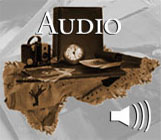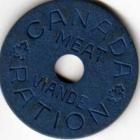15
Canadian soldiers landing on Juno Beach20th Century, June 6, 1944
Juno Beach, Normandy France
 Credits:
Credits:Oshawa This Week, Canada
Oshawa Community Archives
16
Soldiers land on the beaches of Normandy20th Century June 6th, 1944
Juno Beach, Normandy France
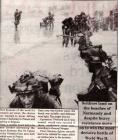 Credits:
Credits:Oshawa This Week, Canada
Oshawa Community Archives
17
"I felt wonderful and hoped that my brother, Nelson Vaillncourt, would soon be coming home." -Clara Lucier (referring to D-Day)
"Canada didn't have as much problems landing on the beaches as the Americans did." -Murray Mackay (referring to D-Day)
"Sure I listened to it that was a milestone, really something." -Resident at Sunnycrest Retirement Home
"We all had great hopes of the war ending after D-day. Our soldiers were real fighters and we were all encouraged with the success of Juno Beach, but still the war continued for another year. We were all happy about the success, yet discouraged with the continuation of the fighting and loss of more lives." - Jeannette Mark Nugent
18
19
Comic used to encourage people to salvage during the war era20th Century, April 1943
Oshawa, Ontario, Canada
 Credits:
Credits:Parkwood, National Historic Site, Archives, General Motors of Canada War- Craftsman volume 2 page 11
20
Comic used to encourage people to salvage during the war era20th Century, April 1943
Oshawa, Ontario, Canada
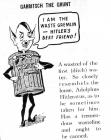 Credits:
Credits:Parkwood, National Historic Site, Archives, General Motors of Canada War- Craftsman volume 2 page 11
21
Comic used to encourage people to salvage paper during the war era20th Century February 1945
Oshawa, Ontario, Canada
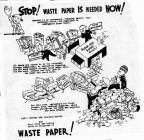 Credits:
Credits:Parkwood, National Historic Site, Archives, General Motors of Canada War- Craftsman volume 4 page 9
22
The government distributed small blue tokens for rationing meat. Many from the local area vividly remember rationing meat and other goods.
"Oh yes I remember the Viende (French) for meat on them. They were light blue. We used to trade the meat rations for sugar rations. We were big sugar users and we used to trade meat coupons for sugar coupons. We traded with neighbours. We used the sugar mostly in our tea. [You] couldn't buy candies, chocolate. Butter was rationed. Sugar was the big thing. I don't think soap was rationed. The grocer on Park Road would tell Mum when there was a shipment of soap. [You] couldn't get gum. We used to buy gum called Thrills, not much sugar in them and you only got a few chews out of them." -Murray Mackay
"I recall that the meat tokens and that various things took more tokens than others...My parents bought all their meat at Cawker's on Simcoe St. North." - Bill Wells
"We tried horsemeat, but just the thought of eating it made our stomach churn." - Clara Lucier
"In our family we only rarely ate meat. So this did not affect us." - Jeannette Mark Nugent
"There was a place, a store in town, and they said they had horsemeat. I never tried it; they said it was pretty good." - Marion Manning
24
Meat ration chart20th Century 1939-1946
Oshawa, Ontario, Canada
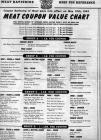 Credits:
Credits:Oshawa Community Archives
25
Ration Book20th Century, August 31, 1943
Oshawa, Ontario, Canada
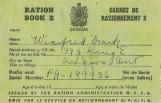 Credits:
Credits:Oshawa Community Archives
26
The ration books included items such as sugar, butter, and tea which were distributed once a month to families. The amount distributed was dependent on the number of people that were to be supported.
"As a mother [I] always canned fruit for the winter, the rationing of sugar was difficult, for the fruit would not be preserved if the syrup was not sweet enough." - Jeannette Mark Nugent
"We received coupon books through the government. You could only use 1 coupon at a time. You were rationed according to the family size. You had to have a car - it was a necessity although it was in the barn most of the time. There was a shortage of sugar, tea, bananas, salmon and gas. You couldn't get girls pajamas" - Edna Vivian
"Gasoline was strictly rationed - you got coupons. I remember them rationing butter and eggs. I was so busy with the plant operation I didn't remember too much about rationing. A lot of the rationing took place because it was being shipped overseas. You all got a book but there were additions some times. I had extra rations because I traveled to Ajax and sometimes I had to go into Toronto." - Syd. Hopkins
"Sugar, tea, butter were all rationed. I had to give my sister the coupons for my wedding. The Betty Cake Shop next to the old Woolworth's on King Street West. They made my wedding cake and sandwiches. They had extra rations to make the cakes. I gave my ration coupons to my sister for the reception." - Marion Manning
"I know how I suffered from culture shock when I came to Canada but I called it being homesick. I had to get used to the different ways. I tried not to point out different ways people did things in Canada. I came from a very rationed society. Practically everything was rationed. There were many more things available in Canada. In England if you were pregnant you had a green ration book and could go to the front of the line. I remember my mum would say - 'You go get it Peg 'cause you can go to the front of the line'." - Margaret Easton
27
Ration calendar for such products as; sugar, tea, coffee, and butter20th Century, August 1943
Oshawa, Ontario, Canada
 Credits:
Credits:Oshawa Community Archives
